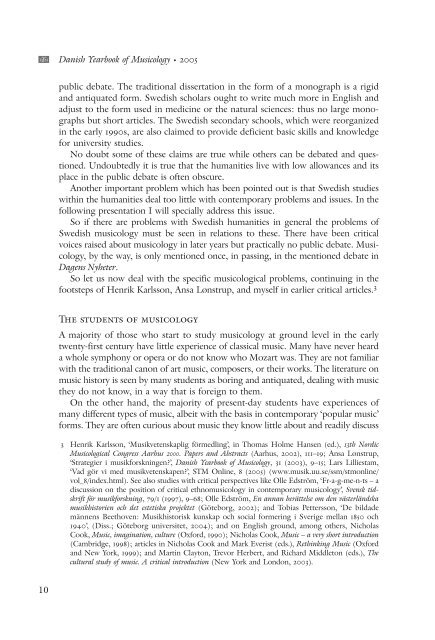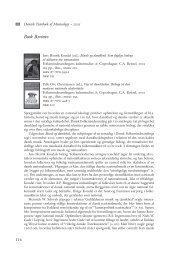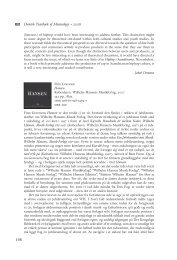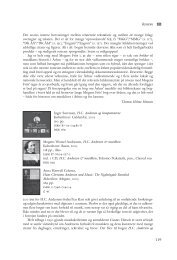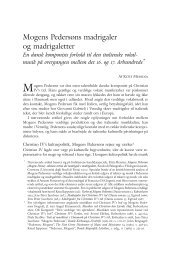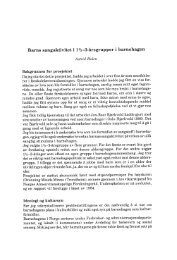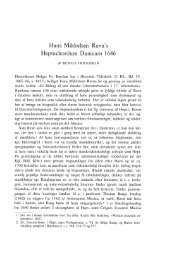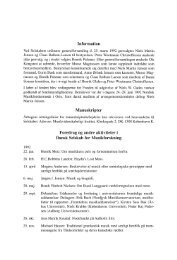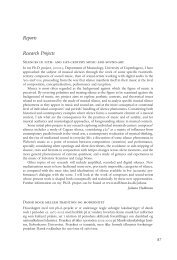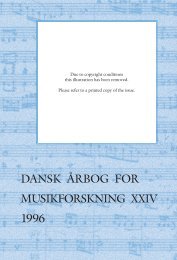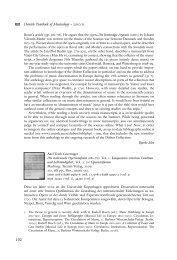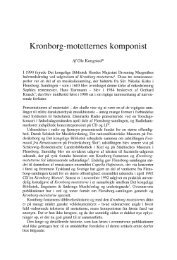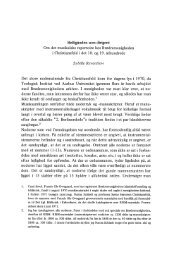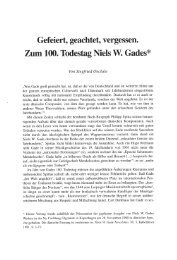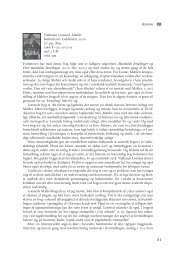Danish Yearbook of Musicology 33 ⢠2005 / Dansk årbog ... - dym.dk
Danish Yearbook of Musicology 33 ⢠2005 / Dansk årbog ... - dym.dk
Danish Yearbook of Musicology 33 ⢠2005 / Dansk årbog ... - dym.dk
You also want an ePaper? Increase the reach of your titles
YUMPU automatically turns print PDFs into web optimized ePapers that Google loves.
<strong>Danish</strong> <strong>Yearbook</strong> <strong>of</strong> <strong>Musicology</strong> • <strong>2005</strong><br />
public debate. The traditional dissertation in the form <strong>of</strong> a monograph is a rigid<br />
and antiquated form. Swedish scholars ought to write much more in English and<br />
adjust to the form used in medicine or the natural sciences: thus no large monographs<br />
but short articles. The Swedish secondary schools, which were reorganized<br />
in the early 1990s, are also claimed to provide deficient basic skills and knowledge<br />
for university studies.<br />
No doubt some <strong>of</strong> these claims are true while others can be debated and questioned.<br />
Undoubtedly it is true that the humanities live with low allowances and its<br />
place in the public debate is <strong>of</strong>ten obscure.<br />
Another important problem which has been pointed out is that Swedish studies<br />
within the humanities deal too little with contemporary problems and issues. In the<br />
following presentation I will specially address this issue.<br />
So if there are problems with Swedish humanities in general the problems <strong>of</strong><br />
Swedish musicology must be seen in relations to these. There have been critical<br />
voices raised about musicology in later years but practically no public debate. <strong>Musicology</strong>,<br />
by the way, is only mentioned once, in passing, in the mentioned debate in<br />
Dagens Nyheter.<br />
So let us now deal with the specific musicological problems, continuing in the<br />
footsteps <strong>of</strong> Henrik Karlsson, Ansa Lønstrup, and myself in earlier critical articles. 3<br />
The students <strong>of</strong> musicology<br />
A majority <strong>of</strong> those who start to study musicology at ground level in the early<br />
twenty-first century have little experience <strong>of</strong> classical music. Many have never heard<br />
a whole symphony or opera or do not know who Mozart was. They are not familiar<br />
with the traditional canon <strong>of</strong> art music, composers, or their works. The literature on<br />
music history is seen by many students as boring and antiquated, dealing with music<br />
they do not know, in a way that is foreign to them.<br />
On the other hand, the majority <strong>of</strong> present-day students have experiences <strong>of</strong><br />
many different types <strong>of</strong> music, albeit with the basis in contemporary ‘popular music’<br />
forms. They are <strong>of</strong>ten curious about music they know little about and readily discuss<br />
3 Henrik Karlsson, ‘Musikvetenskaplig förmedling’, in Thomas Holme Hansen (ed.), 13th Nordic<br />
Musicological Congress Aarhus 2000. Papers and Abstracts (Aarhus, 2002), 111–19; Ansa Lønstrup,<br />
‘Strategier i musikforskningen’, <strong>Danish</strong> <strong>Yearbook</strong> <strong>of</strong> <strong>Musicology</strong>, 31 (2003), 9–15; Lars Lilliestam,<br />
‘Vad gör vi med musikvetenskapen’, STM Online, 8 (<strong>2005</strong>) (www.musik.uu.se/ssm/stmonline/<br />
vol_8/index.html). See also studies with critical perspectives like Olle Edström, ‘Fr-a-g-me-n-ts – a<br />
discussion on the position <strong>of</strong> critical ethnomusicology in contemporary musicology’, Svensk tidskrift<br />
för musikforskning, 79/1 (1997), 9–68; Olle Edström, En annan berättelse om den västerländska<br />
musikhistorien och det estetiska projektet (Göteborg, 2002); and Tobias Pettersson, ‘De bildade<br />
männens Beethoven: Musikhistorisk kunskap och social formering i Sverige mellan 1850 och<br />
1940’, (Diss.; Göteborg universitet, 2004); and on English ground, among others, Nicholas<br />
Cook, Music, imagination, culture (Oxford, 1990); Nicholas Cook, Music – a very short introduction<br />
(Cambridge, 1998); articles in Nicholas Cook and Mark Everist (eds.), Rethinking Music (Oxford<br />
and New York, 1999); and Martin Clayton, Trevor Herbert, and Richard Middleton (eds.), The<br />
cultural study <strong>of</strong> music. A critical introduction (New York and London, 2003).<br />
10


